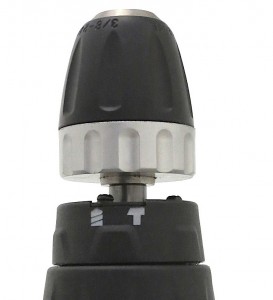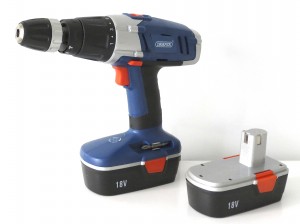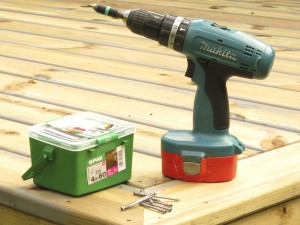Buying a cordless drill
Buying a cordless drill can be a daunting task, because there are so many options on the market, but ownership of one is a must if you do any sort of constructional DIY around the home. Even if the most you do is hang a few pictures, a cordless drill just makes life so much easier, in fact the only difficult thing about these tools is choosing which cordless drill to buy. At the bottom of this guide you’ll find my recommendations for the best cordless drill on the market, as well as a cheaper, budget option, which is still a great tool for more occasional DIY use. The rest of this buying guide explains all the terminology, the different drill specifications, and basically all the information you need for buying a cordless drill.
Cordless drill types

You can tell a cordless drill driver form a cordless combi by looking at the symbols on the collar next to the drill chuck. A little hammer motif, like that shown here, means it has a hammer function, so it’s a combi drill. No hammer motif means it’s just a drill driver.
Fundamentally, there are two types of cordless drill.
- Cordless drill driver – A cordless drill driver is a drill and screwdriver, but cannot be used to drill holes in masonry.
- Cordless combi drill driver – A cordless combi drill driver is a drill and screwdriver, but can be used to drill holes in masonry. You’ll often see them also described as cordless hammer drills.
That’s it – don’t complicate life any more than this. True, there are cordless SDS drills, but these are not multipurpose in that they are primarily used just for just drilling into masonry.
Also there are impact drivers, but these are mainly used for just inserting screws. Both are fantastic for their specific jobs, both are definitely more trade aimed, both are on the seriously expensive side, and both are only an option for the hardcore DIY enthusiast.
So if you’re going to buy just one cordless drill, it’s best to make it the most multipurpose type that you can, and therefore unless you know that you’ll never have to drill into masonry, then it stands to reason that a combi drill is by far the best option.
Cordless drill size and batteries
Size or power of a cordless drill is determined by the voltage. Commonly you get 12V, 14.4V and 18V. Now because these things are so well designed, there is little size/weight difference between them, and so I would recommend you always go for at least a 14.4V, and generally the 18V, as if you’re buying one tool, to use a technical term, you want the most ‘grunt’ for your money.
The other major issue is battery type. You’ll see three types:-
- NiCad batteries – NiCad (Nickel Cadmium) are basically the original type with the only potential issue being that you need to take care when charging the batteries up for the first time, and after that, most manufacturers recommend that you run the battery completely down from time to time before recharging.
- NiMH batteries – The NiMH (Nickel Metal Hydride) batteries are an advance on NiCd in that they don’t have this sensitivity about charging so you literally just crack on charging them when you want.
- Li-ion batteries – The Li-ion (Lithium Ion) batteries are the latest and basically they charge quickly, are very light, and all round fantastic, but flipping expensive*.

Two batteries are just essential. This Draper is one of the best budget cordless drill options on the market, and is supplied with two batteries. For more information on this drill, see further down the page.
Now I’ve spent many a tea break discussing the best way of getting the best charge, longest charge blah blah blah, but my conclusions are always the same. The lithiums are arguably the best, but as yet, for the most part too expensive to have a real crack at the DIY market. That leaves NiMH or NiCad which are still proven technology, sell in their millions, with millions of very satisfied users, including me. I therefore have no problem recommending NiMH and NiCad battery cordless drills.
But…….whatever happens and whatever you decide……make sure the drill you buy specifies that it comes with two batteries, and recharging takes no more than an hour. If there’s one thing that is guaranteed to hack you off, it’s stopping mid-job to wait for a battery to recharge!
Which is the best cordless drill make?
In deciding which is the best cordless drill make, for average to high DIY use, I do tend to stump for the big brands in the market, and my opinions and experiences of some of the major cordless drill manufacturers are briefly outlined below.
- Panasonic – Owned one, loved it, broke. Bought another, loved it, broke. Also had 24V SDS drill, loved it, broke. Conclusion – such a shame, but still love their tellies.
- De Walt – Owned one, some people love them, I think they feel bulky in your hand. Conclusion – Fine tool, but I think their best designs are with their mitre/chop saws.
- Hitachi – Owned one, didn’t like it, always thought it was really noisy, and worried that they seem to be sold at knock down prices in builders merchants. Conclusion – Also had mitre saw that screamed the house down. Still a good tool but noisy.
- Bosch – Like De Walt, have friends that love them, reliable, but still just have that bulky heavy feel. Conclusion – You’ll have no problems, but I don’t feel that cordless combi drills are their best power tools.
- Black and Decker – The name that says DIY, I’ve never seen them much on building sites, but never had a problem when I’ve used them. Conclusion – Work fine, but in their class, I think I’d go for cheaper options.
- Makita – I’ve had two Makita 18v combi drills. One was put through a life that could only be compared to that of a slave breaking rocks for a lifetime – it didn’t wear out. One day, after so many years of never feeling like it had been fully exerted, it just walked away (or come to think of it, it may have just been nicked….). The replacement has suffered a similar life of near constant servitude and abuse – left out overnight, dropped from scaffolding, choked in inches of dust – all of which I don’t recommend, but it still comes back purring for more.

My cordless combi after a little decking project, and believe me, I was much more tired than it was. If for some reason it did decide to retire itself, I’d be straight out to buy another one.
Therefore if you’re buying a cordless drill, for me, the 18v Makita cordless combi drill leaves all others in its wake, whether for DIY or professional use. It won’t be beaten for build quality and reliability, and with prices often coming in under £100, there can’t be any other DIY tool on the market that offers better value for money.
If you do need a cheaper, budget option for a cordless combi, my choice is the Draper 18v. For around about half the price of the Makita, you still get an incredibly powerful all-purpose drill.
Where to buy
The Makita 18v cordless combi is available on Amazon, as well as the Draper 18v combi, and I’d suggest that this is the best starting point for finding the best prices. Both drills can also be found in such outlets as Screwfix and Tooled-Up.
*Since the time of writing this review I’ve noticed that the price of an 18v Makita Lithium Ion drill (with the crucial two batteries) has come down considerably. You’ll sometimes even find it at a similar price to the NiCad battery model that I have championed in this review. Therefore you should certainly consider the Li-ion option, if you can find a good price!

have you had anything to do with ryobi power drills
Hi Roger,
I haven’t owned one, but with the people who I’ve spoken too who have owned them – there’s been some pretty mixed reviews. On those grounds alone, they don’t get onto my recommendation list. If you’re looking to buy a group of cordless tools, then their one plus range where all their batteries fits all their tools could be an option, but I just think there are much better tools out there.
If you’re meaning ‘ryobi power drill’ as an electric corded drill, then again, there are better options, in my opinion. You just can’t go wrong with the Makitas – especially at the prices you are able to buy them these days.
Best
Julian
Couldn’t agree with you more on the Makita front… I own (what appears to be) the exact same model as you and over the last few years it’s been subjected to everything that the serious DIYer could throw at it and it just keeps coming back for more.
I’m in the market to upgrade / replace it at the moment and really can’t see past the equivalent model with the Li-Ion batteries.
Truly a cracking piece of kit for the price.
Thanks for your comment Derek!